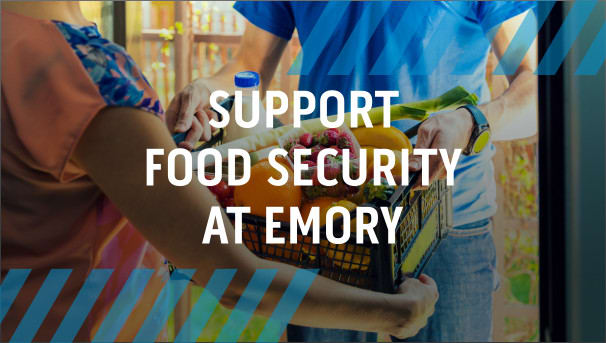Support Student Food Security at Emory
How does food insecurity affect the Emory community?
Hunger and food insecurity on our campus is real. Between academic years 2016-17 and 2018-19, Student Intervention Services saw an 80 percent increase in the number of students requesting assisting with food-related needs. Food insecurity issues and concerns among students on college campuses nationwide continue to rise and Emory, unfortunately, is not an exception to this trend.
We know food insecurity makes it hard for students to stay in class and succeed, and our goal is to help students understand and identify food insecurity, as well as making nutritious food readily available to students when they need it.
Support the Emory Food Security Fund
For some Emory students, not knowing where their next nutritious meal will come from is a real challenge. These students lack consistent, dependable access to food (especially during school breaks) which affects the quality of their Emory education and experience.
Gifts to the Food Security Fund help alleviate food insecurity within the Emory student community by supporting food assistance programs on campus as well as options for students to purchase their own food during breaks. One student shared, "As a student who has generally provided for myself since coming to college, this assistance program has been very helpful in ensuring I don't go hungry."
You can make an impact
- $44 for the 44% of college students who cut meal size or skip meals due to financial hardship (according to National surveys)
- $80 could provide one week of groceries for a student
- $160 could provide two weeks of groceries for a student
- $320 could provide one month of groceries for a student
Student Case Management and Intervention Services at Emory University—which assists students and their families on an ongoing basis and in times of crisis, including but not limited to meeting academic, medical, financial, and social challenges—will administer the program.
Looking to make an even bigger impact? You can serve as an Advancement Volunteer, a digital ambassador promoting giving to the Food Security Fund, and receive additional resources and tips for sharing the campaign.
What is food insecurity?
Simply put, food insecurity encompasses the uncertain and inconsistent conditions that can lead to hunger.
The U.S. Department of Agriculture (USDA) defines food insecurity as a lack of consistent access to enough food for an active, healthy life and according to Feeding America, food insecurity is “a federal measure of a household’s ability to provide enough food for every person to have an active, healthy life.”
Whether you’re a student interested in connecting with supportive resources, or you’re referring a student you’re concerned about, making a referral to the Student Case Management team is simple. Complete this web form to submit a self-referral or refer a student to speak with a Case Manager. All referrals are kept private to the fullest extent possible by law and consistent with university policy.


